The Truth About Fashion is a unique, collaborative and educational project designed to create space for student voices.
To discover the truth about fashion, a team of Polimoda teachers and students designed an unconventional survey using the methodology conventionally applied during educational projects: students found out the main values, references and questions that young generations would consider important for the future of fashion through a co-created approach to research. Then, the survey focused on cross-checking the most relevant attributes and questions found in the projects presented by each student team.
The project was carried out by a group of students from our third-year Undergraduate in Fashion Marketing Management and Business of Fashion programs, supervised by two Polimoda faculty members.
Generation Z and Millennial students from 54 countries participated and had one month to answer the questions truthfully. About half of those who participated were in the 18-22 age group. The other half were in the 23-31 age group. Students investigated and came up with the most honest and relevant questions to them. Over 300 students participated, but this research was not meant to be quantitative.
Values and Attributes
As representatives from the qualitative group global nation of youth, respondents expressed themselves on how they evaluate the fashion system based on authenticity, sense of belonging, self-expression, freedom, provocation, mental health, inclusivity, subcultures, sexual orientation and cultural fashion.
Once identified as main values deemed relevant to analyzing fashion, the global nation of youth explained what they mean when discussing concepts often misinterpreted by brands and media.
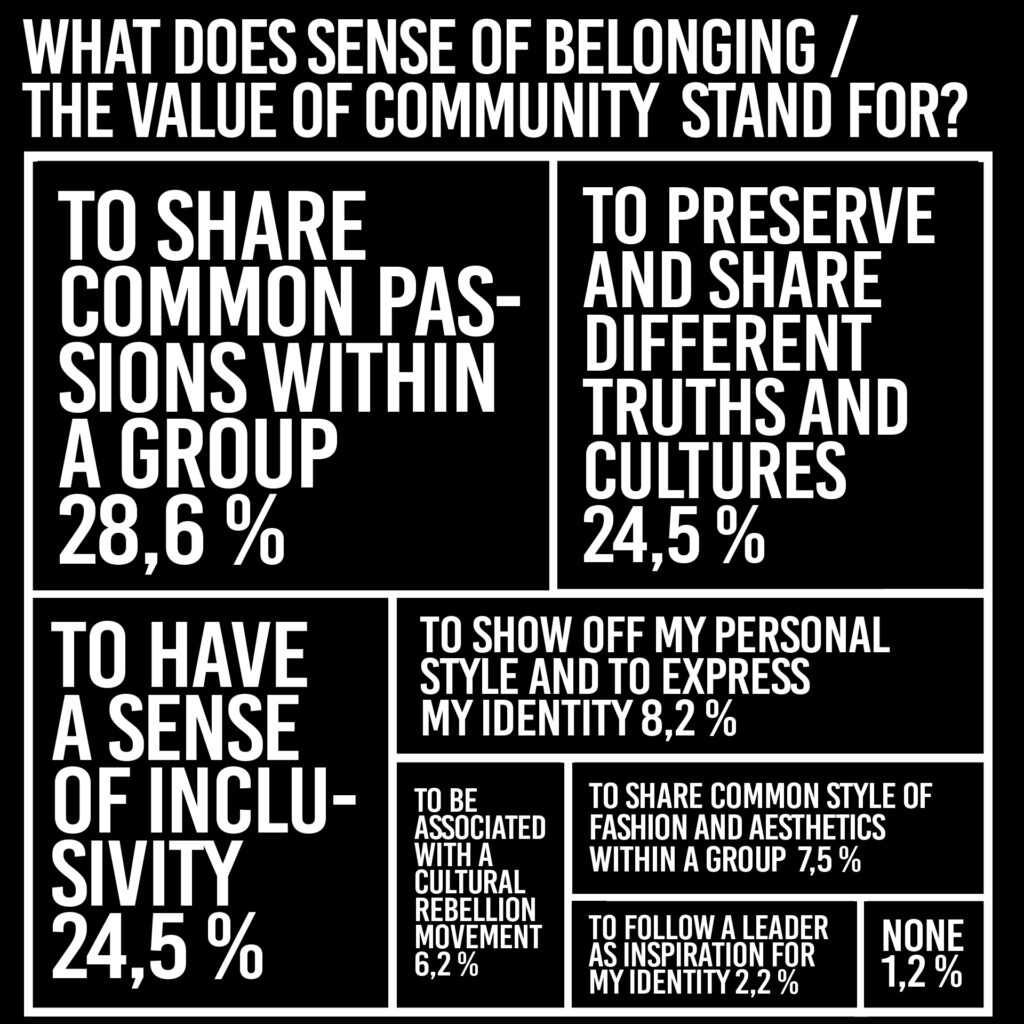
Belonging
Sense of belonging represents not only one of the first values mentioned as relevant to young demographics when it comes to the essentials of life, but it was also the first attribute to refer to and evaluate fashion brands. The ideal of community, central in the lives of today’s young Gen Z and Millennials, has been broken down into specific areas, clearly showing what a “sense of belonging” means to them exactly.
Implications for the global nation of youth: to belong to a community means to be responsible for communicating, sharing and taking on the responsibility of generating a space where you can preserve your identity and accept others.
Implications for fashion brands: generating valuable content to be shared should be a priority for a fashion brand wishing to help with the creation of a fruitful community and trying to give a real interpretation to different cultures —not by imitating, but by co-creating and appreciating.
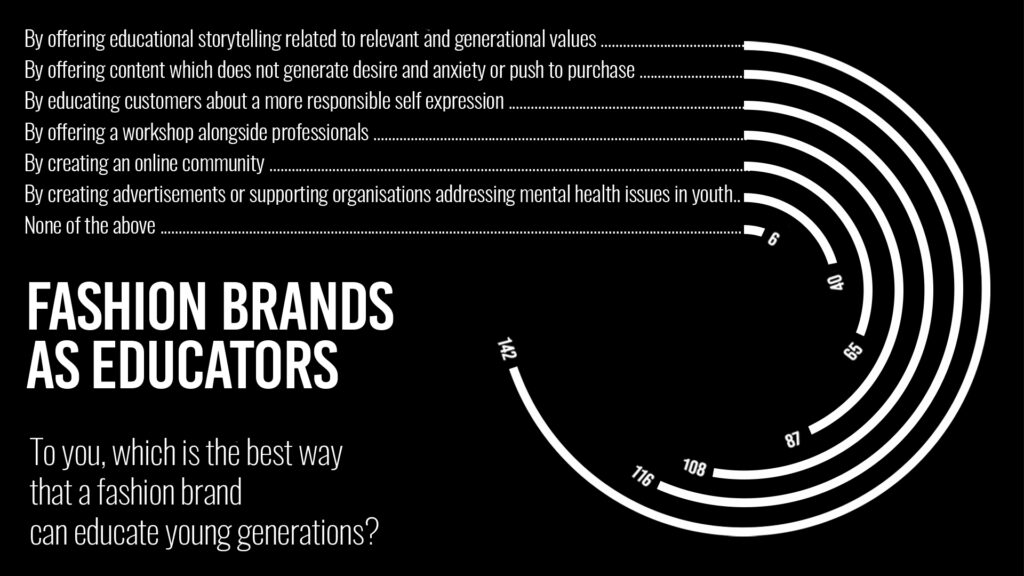
Education
Education has been appointed as a key attribute to evaluate a fashion brand, and it has to do with a specific series of values, like meaningfulness and respect, which are lacking in many areas of the market and in communications. As a result, respondents ask fashion brands to help them avoid the anxiety generated by invasive content or through their approach.
Overall, young Gen Z and Millennials prefer hands-on workshops and experiences, feeling the relevance of a real and educational online community that is more sensitive to mental health issues.
Implications for the global nation of youth: today, most young fashion students use Instagram and social media to find fashion content and stay updated. They value being able to select and search, with a specific approach, credible and educational fashion brands.
Implications for fashion brands: the ability to connect with younger generations in this context —not only through promotional digital content and actions, thus risking the generation of anxiety or simply pushing people to purchase— but through relevant and meaningful storytelling. Linking fashion brands to key values, emotions and statements has become more pressing than ever. Finally, brands must pay attention to a more responsible and credible self-expression, recognizing ambassadors and faces as a key evaluation tool, and acting responsibility.
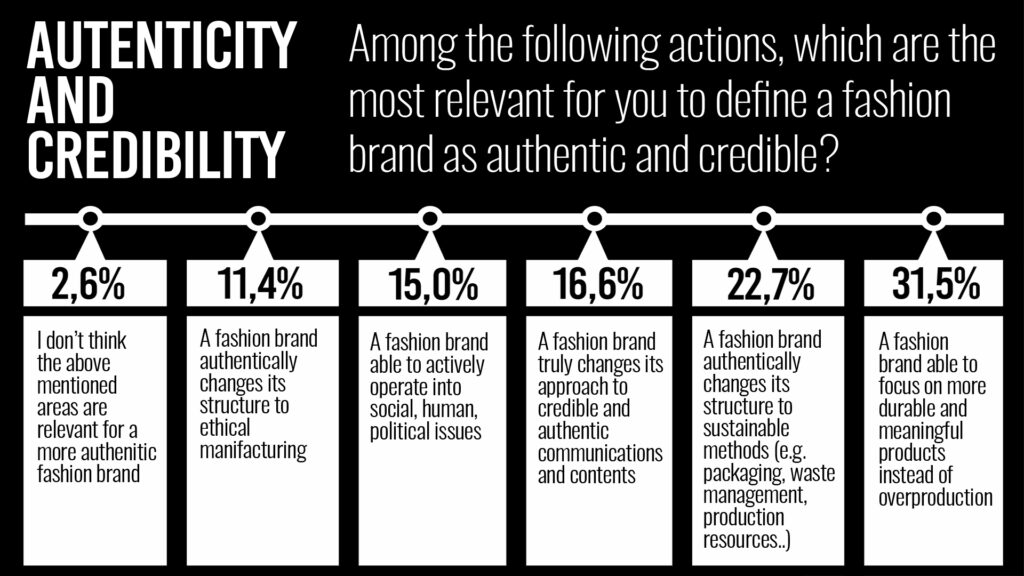
Authenticity
In the world of fake news and with the loss of trust in institutions and information, young people respond with a clear demand for credibility, authenticity and concrete trackable actions instead of a discourse of intent.
Implications for the global nation of youth: opening a clear discussion with their favorite brands; recognizing the difference between an authentic approach and always investigating the structure of production, communication and approach of a company could help not only them and their mates but also help fashion brands improve.
Implications for fashion brands: a focus on the impact of actions based on non-authentic practices and on the impact of short term sales instead of long term trust.
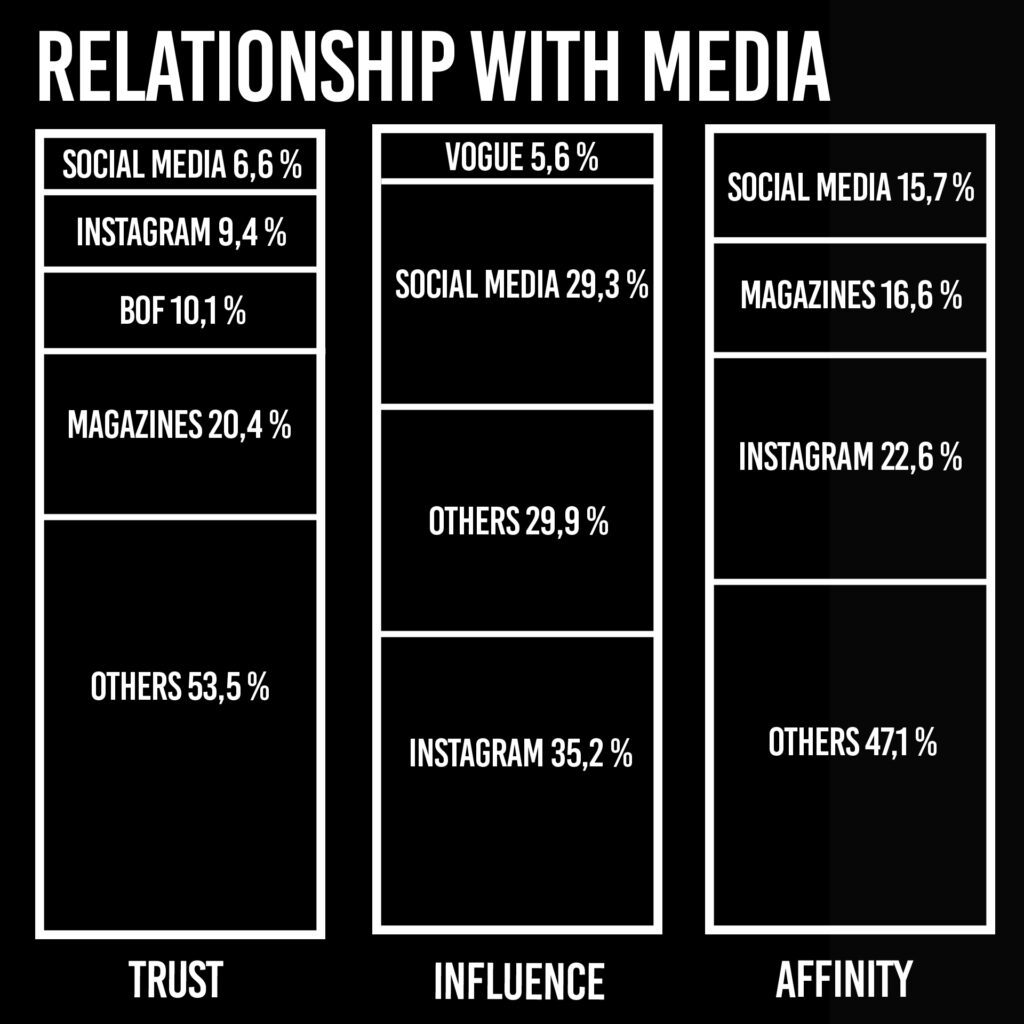
Media
Due to the important role, yet complicated landscape, of fashion media, the research included the relationship between young generations and the media. Students were asked to think about the media from three different points of view: trust, influence and interests.
Looking at specific media brands or platforms, Instagram is the most relevant medium from all points of view. Instagram leads the way both in terms of influence and interests, being almost at the same level as Business of Fashion in terms of trust.
For trust and influence, a few selected publishers are also considered as relevant by younger generations, yet not at the same level as Instagram: Vogue, WWD, GQ and Vanity Fair.
For interests, on the other hand, we have a more diversified landscape, with titles such as Man Repeller, I-D, Dazed & Confused, Highsnobiety, Hypebeast, Freeda, Numéro and specific editions of Vogue (UK, US and Arabia), or YouTube, LinkedIn, Reddit, Pinterest and Telegram among social media platforms closer to their interests.
Considering only the macro categories: magazines, social media, digital platforms and traditional media(excluding specific media brands/platforms mentioned by their name), we see how magazines in general are considered the type of medium that young generations trust the most. Magazines are also the type of medium closest to their interests, just as much as social media.
Despite what they trust and what is closer to their interests, when it comes to influence, they have no doubts: today, the power of influence goes to social media and digital platforms.
According to Gen Z and Millennials, magazines play a very small role in terms of influence and TV is mentioned only a couple of times.
Implications for brands: it’s important to keep their media plans diversified throughout different types of media, in order to reach out to the right audience with the right content in terms of interests, while building trust and expanding influence through the strongest channels.
An Instagram-driven digital strategy still makes sense in terms of reach and awareness, but many more platforms need to be taken into account when it comes to delivering interesting content for relevance and consistency.
Trust
When it comes to trust, magazines are the first destination for Gen Z and Millennials —print or digital no longer needs to be specified— while social media and digital platforms in general seem to have a minor role compared to magazines. Traditional media, newspapers and books are also mentioned by a small group of participants as the type of medium they trust the most.
Looking at specific media brands and/or multimedia platforms, the surveyed future fashion professionals consider The Business of Fashion and Instagram as the most trustworthy ones, followed by Vogue, WWD, GQ and Vanity Fair. Among the mainstream fashion media, niche magazines such as Kinfolk or Cereal Magazine are mentioned as trustworthy sources as well.
Not to be ignored is an interesting group of respondents, stating that they don’t trust any media or that they only trust their “own brain and its ability to analyze any info coming from all those media.”
Influence
If magazines play the most important role in terms of trust over social media, results are subverted in the sphere of influence. Social media and digital platforms in general are considered, without a doubt, the most influential type of media, with Instagram leading the way above all other important names of the fashion publishing industry such as Vogue, WWD and Vanity Fair, which are considered as the most influential ones only by a minority of surveyed Gen Z and Millennials.
Among other social media considered as influential, we notice a timid presence of Twitter and Tik Tok. Worth noticing also is the almost total absence of celebrities and influencers, leaving the open question of whether they are not considered as media at all or if they are not considered to be influential.
Affinity
Showing a clear take on the fashion media landscape in terms of trust and influence, results are a bit more varied when talking about the media closest to the interests of surveyed Gen Z and Millennials.
Instagram still represents the strongest medium, offering a wide range of content close to young people’s interests. At the same time, different types of media, magazines and other social media platforms, never mentioned in the previous questions, are emerging here; they range from books, movies and documentaries to different social media platforms such as YouTube, LinkedIN, Reddit, Pinterest and Telegram.
The list of magazines becomes long and diversified, compared to the previous areas of research: Man Repeller, I-D, Dazed & Confused, Highsnobiety, Hypebeast, Freeda, Numéro and specific editions of Vogue (UK, US and Arabia) are under the eye of some surveyed Gen Z and Millennials.
Someone also reminds us about the consequences of overwhelming content, stating “I’m bored of everything now.”
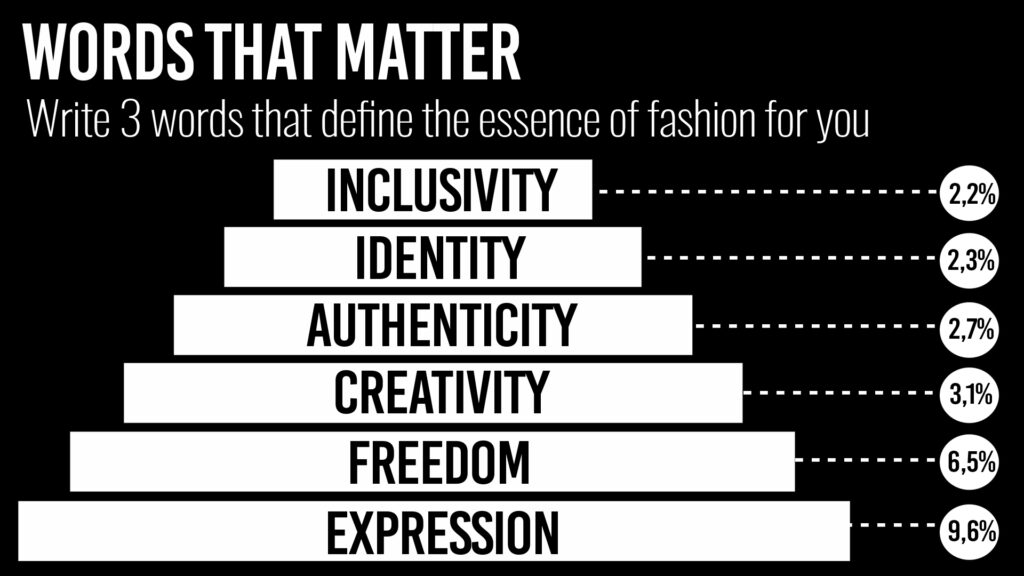
Brands
In the first part of the survey, we explored the most relevant values that younger generations take into account when considering fashion brands, and what their meaning is. These considered values are: inclusivity, sense of belonging, cultural involvement, sense of freedom/self-expression, authenticity, education and sustainability. In the second part of the survey, we asked participants to mention the brands that best incorporate each one of the considered values and how relevant they are.
Having previously explored the importance of specific values for Gen Z and Millennials, the reflection of them in specific fashion brands can be seen here.
All the considered values —inclusivity, sense of belonging, cultural involvement, sense of freedom, authenticity, education and sustainability— are seen as highly important when judging a fashion brand. Authenticity is the most important one, followed by a sense of freedom/personal expression. Sustainability, Sense of belonging, Education and Inclusivity are all at the same level of importance, but still quite high.
If Gucci is the only brand always present in the top 5 results for each of the considered values, and the absolute first one for 4 values (inclusivity, sense of belonging, cultural involvement and sense of freedom) out of 7, things are not so clearly defined when it comes to education and sustainability with “I don’t know/no reply” as the highest result. The most authentic brand results to be instead Jacquemus, though with a quiet high uncertainty in the association of the value to specific brands.
The most inclusive brands after Gucci are Fenty, Jacquemus, Louis Vuitton, Balenciaga, as well as Nike, Zara and H&M. However “I don’t know / None” replies are quite relevant, showing certain doubts in the identification of inclusive brands.
Fashion brands creating the strongest sense of belonging are Gucci, Rick Owens, Nike, Jacquemus and Balenciaga, followed by Louis Vuitton and Prada. Looking at sense of freedom or personal expression, Gucci is again leading the way, this time followed by Maison Margiela, Jacquemus, Vivienne Westwood, Nike, Dior and Alexander McQueen.
When it comes to sustainability and the educational role of fashion brands instead, no specific brands are easily associated with these values. When asked about the most educational brand and the most sustainable brand, surveyed Gen Z and Millennials show high uncertainty, with the highest number of replies given by the sum of “I don’t know / None / No reply”. The first educational brand mentioned is Gucci, while the most sustainable brands (after “I don’t know”) are Stella McCartney and Patagonia.
However, when it comes to authenticity, Jacquemus is the brand best expressing this value, despite the high uncertainty also given in this case by a high amount of “I don’t know / No reply.” Jacquemus has a rather high association with other values as well, such as inclusivity, sense of belonging and sense of freedom.
Cultural involvement is another value where, after Gucci, we have identified a high amount of “I don’t know / None” replies, highlighting a lack of association between the value and specific brands in this area too.
Implications for brands: while a sense of belonging and sense of freedom seem to be easily reflected in the activities of specific fashion brands —and somehow also inclusivity with room for improvement— other areas show a lack of focus from fashion brands, despite being very relevant to young generations.
Education, followed by sustainability, are the values with the highest uncertainty in being clearly related to specific fashion brands.
Together with authenticity and cultural involvement, they are the values to work on in the future of fashion, as seen by Gen Z and Millennials.
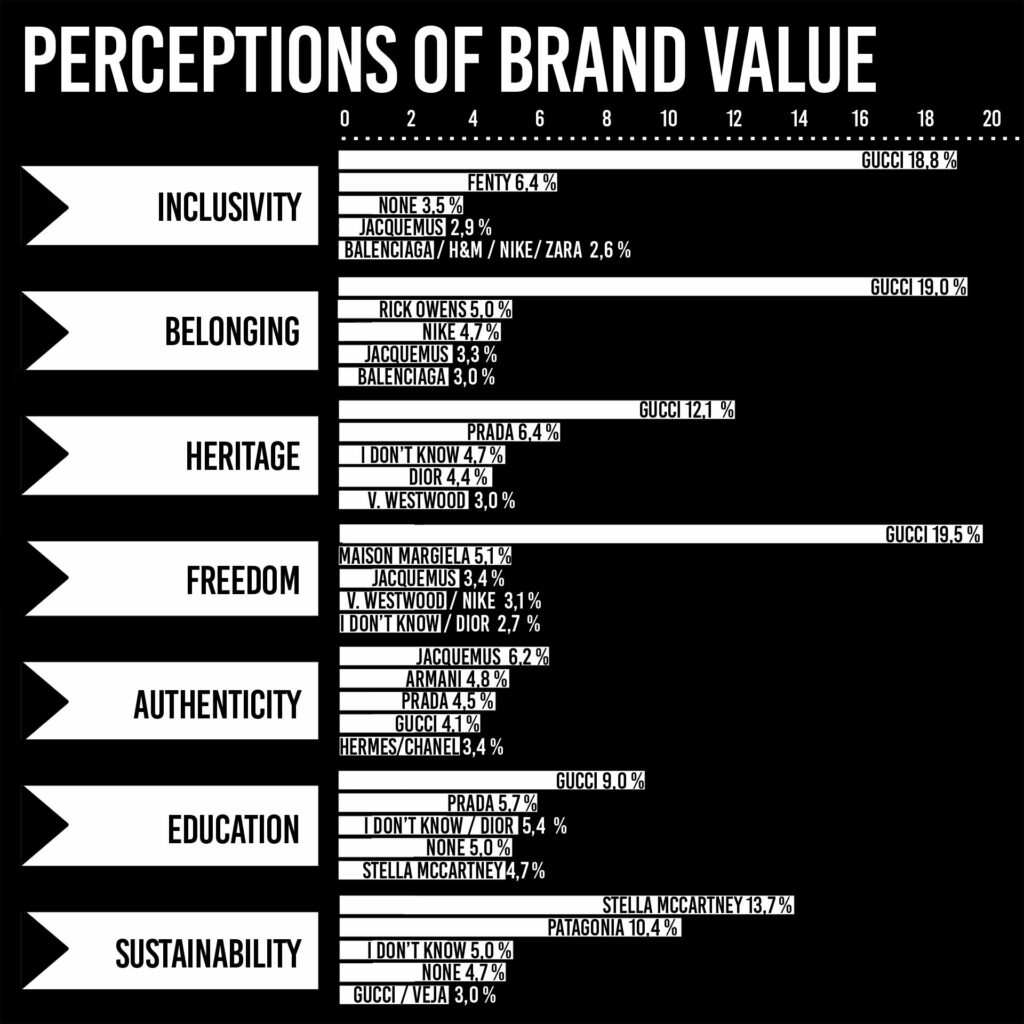
Inclusivity
Gucci is definitely considered the most inclusive brand, followed by Fenty, Jacquemus, Louis Vuitton, Balenciaga, as well as Nike, Zara and H&M. However, “I don’t know / None” replies are quite relevant, showing certain doubts in the identification of inclusive brands.
Other brands mentioned as inclusive: Telfar, y/project, Eckhaus Latta, or ThirdLove and Chromat with a special focus on body types.
Belonging
Fashion brands creating the strongest sense of belonging, reflecting into a specific community of people who share values and interests, are Gucci first of all, followed by Rick Owens, Nike, Jacquemus and Balenciaga, followed by Louis Vuitton and Prada.
Other important brands that represent cornerstones of contemporary fashion are often mentioned as the most relevant ones for the strong sense of belonging that they develop: Maison Margiela, Helmut Lang, Alexander McQueen, as well as Dior and Saint Laurent.
Interesting mentions are Charles Jeffrey Loverboy and “everywhere where Hedi Slimane had worked.”
Heritage
Despite Gucci’s undiscussed leadership, in terms of cultural involvement, we have identified a high amount of “I don’t know / None” replies, highlighting a lack of association between the value and specific brands. In this area, Prada, Dior, Vivienne Westwood and Alexander McQueen are, in any case, identified as culturally involved brands.
Other brands mentioned for this value by some of the respondents are: Loewe, Boris Bidjan Saberi, Undercover and Wales Bonner.
Freedom
Looking at sense of freedom or personal expression, Gucci leads the way once again, this time followed by Maison Margiela, Jacquemus, Vivienne Westwood, Nike, Dior, Alexander McQueen and Comme des Garçons.
Other brands appreciated for their sense of freedom/personal expression are: Charles Jeffrey Loverboy, Diesel, Eckhaus Latta and Moschino.
Someone reminds us about the possibility of associating this value to different brands, stating: “It depends on what I want to express.”
Authenticity
With Gucci being the first brand associated with all the previous values so far, things are different when it comes to authenticity. Here, Jacquemus is the brand best expressing this value, despite the high uncertainty given in this case, once again,by a high amount of “I don’t know / No reply.” Jacquemus has a pretty high association with other values as well, such as inclusivity, sense of belonging and sense of freedom.
These results are as surprising as important, considering that authenticity is given as the most important value above all others by surveyed Gen Z and Millennials.
Other brands considered as the most authentic ones are: Armani, Prada and Gucci (but on a lower level compared to the high association to the other values). Others include Gabriela Hearst, Ganni, GCDS and Geoffrey B. Small results to be perceived as authentic by a group of respondents.
Education
When it comes to the educational role of fashion brands instead, no specific brands are easily associated with this value. When asked about the most educational brand, surveyed GEN-Zers and Millennials show high uncertainty with the highest number of replies given by the sum of “I don’t know / None / No reply.”
The first educational brand mentioned is Gucci, followed by Prada, Dior and Stella McCartney, as well as Patagonia, Armani, Maison Margiela and Louis Vuitton.
Other brands mentioned with a certain association to the educational value are: Gabriela Hearst, Geoffrey B. Small, Hussein Chalayan, Veja and Pangaia.
Sustainability
For sustainability, similarly to education, no specific brands are easily associated with these values, given the highest number of replies of “I don’t know / None / No reply.”
The first brands mentioned as the most sustainable ones, following the uncertainty answers, are Stella McCartney and Patagonia. Gucci and Veja follow right after.
Other brands mentioned with a certain frequency for their sustainable approach are: Everlane, Filippa K, Nudie Jeans and Bethany Williams.
Highlights
Fashion is freedom. Fashion is expression. Fashion is creativity
When asked to summarize the essence of fashion, the message sent from our students is clear: fashion is freedom and creativity. Luxury does not belong to this territory. What is fashion, if not an expression? What is fashion, if not freedom? What is fashion, if it doesn’t belong to anything? What is fashion, if not authentic?
Fashion as we know it comes from the experimentation and interpretation of social changes. The strongest brands have become relevant because of the risks they take, the declarations they make, or their aesthetic for young generations and subcultures. The market today is full of options and meanings. This research brings to light the global nation of youth’s need to find their identity in fashion — just like older generations did — and with the same desire to belong to something in an authentic way.
“Luxury” does not reflect the future categories of fashion
The term luxury is no longer a way that young people differentiate brands. Brands, just like the media, have become a fluid category and — while magazine covers have become works of art — young people are looking at pixelated images on peer-to-peer platforms and content shared by their friends. Fashion is perhaps no longer a synonym of luxury. It’s become a common language used by young people. With this in mind, could the Global Nation of Youth become a subculture?
The fashion system is judged by authenticity
Authenticity is the most relevant value for young generations in addition to freedom. The Global Nation of Youth is aware of fake news and the lack of truthful information on social networks. That being said, young people think authenticity is the most important aspect of the fashion system and they have a hard time believing what they read. They are looking for concrete changes and actions: the elimination of wasteful production practices, a true reorganization of production methods and most of all, brands that focus on meaningful and durable products with environment-friendly practices.
Brands must practice the inclusivity they preach
Brands promote a variety of different races and ethnicities in their fashion advertising yet, within their companies, young people acknowledge that there is still a struggle within work culture. Offering a bigger range of sizes and using models from all over the world isn’t enough for younger generations. Companies must focus on diversity hiring. Young people would like to eliminate discrimination in the workplace based on sexual orientation, race and religion. Some brands must do the work within their companies on the inside and start practicing what they preach on the outside. They must promote freedom.
Young people in fashion want to feel like they belong
A sense of belonging is one of the most important values for younger generations. For Millennials and Generation Z, feeling part of a community is a fundamental aspect of life and also something they look for in fashion brands as well. When we asked our students about the meaning of “sense of belonging,” they shared feelings on identity, music and their passions. Young people want brands to focus on what we all have in common instead of our differences.
The fashion industry generates anxiety and uses push to purchase strategies irresponsibly
Education is a key factor when evaluating a fashion band. Respect is an important value missing in the fashion industry. The market is aggressive and the push to purchase strategies are stronger than ever. If you think about it, Instagram was a social network for sharing beautiful photos in 2011 and today, in 2020, it has become a giant e-commerce. Brand values are perhaps missing. Young generations are starting to notice this trend and believe communication that creates anxiety must be eliminated and brands — including their ambassadors — must start educating themselves and acting responsibly with their storytelling.
Is Gucci becoming a fashion benchmark for younger generations?
Gucci is the closest brand to Generation Z and Millennial values. Their scores ranked very high overall and they are considered authentic. However, the findings show that there might be a sense of mistrust. On the other hand, Jacquemus, a brand created by a young Millennial in the south of France, was mentioned for authenticity and sustainability.
Outside-the-system fashion brands are rising in relevance
Young generations still love big brands because of their values, but there is an interesting panorama emerging of new niche brands loved for their authenticity, education and sustainability. A few examples are Gabriela Hearst, Pangaia, Bethany Williams and Nudie Jeans. Some of these examples aren’t considered fashion brands, but digitally born brands offering communication and production in line with values of authenticity and education. Old school brands are still relevant: Rick Owens for a sense of community, Margiela for freedom and Prada for culture.
There is uncertainty related to sustainable fashion brands
Uncertainty is high in this area. Sustainability is still connected to brands like historically sustainable Patagonia and Stella McCartney. Some new brands are considered authentic with a less wasteful approach like Veja, Pangaia and Bethany Williams. Big brands with recent sustainable approaches were not strongly associated with sustainability as a value.
Instagram is the fashion medium and there isn’t a fashion medium
There is no longer a clear distinction for young people when it comes to fashion consumption. They live between the fluidity of platforms and networks. Magazines are a macro category; books, music and social media are all considered “media” and Instagram is the medium of excellence as far as interests, truth and influence. Celebrities and influencers were not considered media by students. A high number of young people don’t trust the media; they only trust their brains. Some say they are bored with everything, probably due to the overwhelming quantity of content they are exposed to.
Conclusions
Over the last decades, fashion has detected, created and represented authentic social identity for cultural movements. Roads to freedom are explored when young generations express their deepest social motivations. Truth be told, what is fashion if not freedom?
Today, young people are aware of the lack of authentic artistry in the fashion industry and are demanding change. To be trusted once again, fashion brands must be meaningful, make statements, practice the diversity, inclusivity and sustainability they preach and build an honest community.
The quest for authenticity led to the downfall of fashion media. We know Instagram is very important and also overwhelming for Generation Z and Millennials. They are bored and overexposed to content and fake news. They have trust issues with what they read online.
As far as companies, big brands haven’t lost their touch and are still close to the values of young generations, including a sense of belonging and freedom. However, there is an interesting landscape of new and more niche brands emerging — especially in terms of authenticity, education and sustainability.
These values, together with inclusivity and cultural involvement, are the ones expected to shape the future of fashion, as seen by Generation Z and Millennials. That is the truth, the whole truth and nothing but the truth about fashion.
Credits
Third-year Undergraduate in Fashion Marketing Management and Business of Fashion students: Camilla Chiarolanza, Laura Casini, Marco Covitto, Alessandro Candelori, Francesca Crestani, Anastasia Basano, Catalina Bastida, Valentina Doria, Steven Addae, Ella van Niekerk, Janie Marais, Arianna Fabris, Tanya Ganeriwal, Laius, Camilla Zanzotto, Kaja Steindl, Brando Coleman, Naomi Tajiti, Daniela Palacios, Daniela Ballon, Gianella Quesada, Alejandra Echegaray, Camil Guerra, Manuela Buitrago, Sumin Kwon, Maria Fernanda Ramirez, Antonio Ligorio, Maddalena Bartolini Baldelli, Alice Botteon, Diana D’Anniballe, Claudia Salutari, Desiree Silvestri, Bertolini Sofia, Cioffi Elisabetta, Gentile Francesca, Pellicci Federica, Claudia Passarella, Colette Cipriani, Maria Giulia Pergola, Sofia Arnoldi, Martina Corrente, Camilla Morel, Beatrice Deprati, Camilla Chiari, Caterina Patierno, Michelle Mitku, Arianna Vantini, Carolina Panetta, Ivanna Faidutti, Sara Vasconez, Natalia Smigielska, Mina Vuletic.
Faculty members: Lilit Boninsegni and Silvia Fossati, leading teachers of Polimoda’s Business Department.